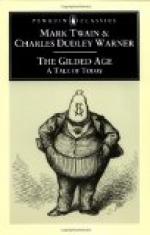Harry said, “I have it in mind. I believe I would begin attending lectures this winter if it weren’t for being wanted in Washington. But medicine is particularly women’s province.”
“Why so?” asked Ruth, rather amused.
“Well, the treatment of disease is a good deal a matter of sympathy. A woman’s intuition is better than a man’s. Nobody knows anything, really, you know, and a woman can guess a good deal nearer than a man.”
“You are very complimentary to my sex.”
“But,” said Harry frankly; “I should want to choose my doctor; an ugly woman would ruin me, the disease would be sure to strike in and kill me at sight of her. I think a pretty physician, with engaging manners, would coax a fellow to live through almost anything.”
“I am afraid you are a scoffer, Mr. Brierly.”
“On the contrary, I am quite sincere. Wasn’t it old what’s his name? that said only the beautiful is useful?”
Whether Ruth was anything more than diverted with Harry’s company; Philip could not determine. He scorned at any rate to advance his own interest by any disparaging communications about Harry, both because he could not help liking the fellow himself, and because he may have known that he could not more surely create a sympathy for him in Ruth’s mind. That Ruth was in no danger of any serious impression he felt pretty sure, felt certain of it when he reflected upon her severe occupation with her profession. Hang it, he would say to himself, she is nothing but pure intellect anyway. And he only felt uncertain of it when she was in one of her moods of raillery, with mocking mischief in her eyes. At such times she seemed to prefer Harry’s society to his. When Philip was miserable about this, he always took refuge with Alice, who was never moody, and who generally laughed him out of his sentimental nonsense. He felt at his ease with Alice, and was never in want of something to talk about; and he could not account for the fact that he was so often dull with Ruth, with whom, of all persons in the world, he wanted to appear at his best.
Harry was entirely satisfied with his own situation. A bird of passage is always at its ease, having no house to build, and no responsibility. He talked freely with Philip about Ruth, an almighty fine girl, he said, but what the deuce she wanted to study medicine for, he couldn’t see.
There was a concert one night at the Musical Fund Hall and the four had arranged to go in and return by the Germantown cars. It was Philip’s plan, who had engaged the seats, and promised himself an evening with Ruth, walking with her, sitting by her in the hall, and enjoying the feeling of protecting that a man always has of a woman in a public place. He was fond of music, too, in a sympathetic way; at least, he knew that Ruth’s delight in it would be enough for him.
Perhaps he meant to take advantage of the occasion to say some very serious things. His love for Ruth was no secret to Mrs. Bolton, and he felt almost sure that he should have no opposition in the family. Mrs. Bolton had been cautious in what she said, but Philip inferred everything from her reply to his own questions, one day, “Has thee ever spoken thy mind to Ruth?”




